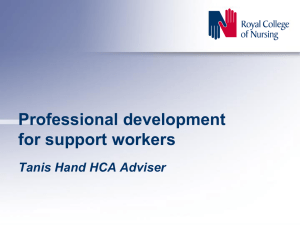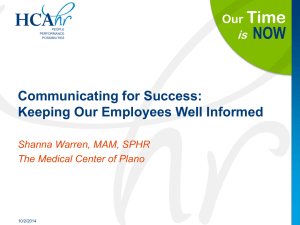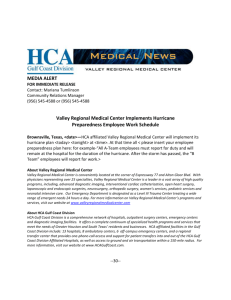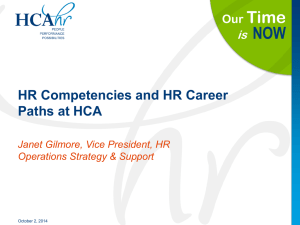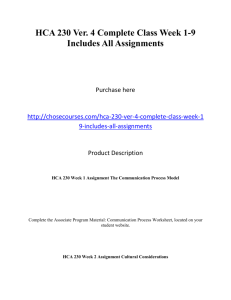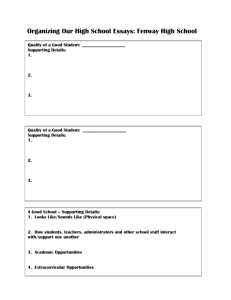The HCA Clinical Advantage
advertisement
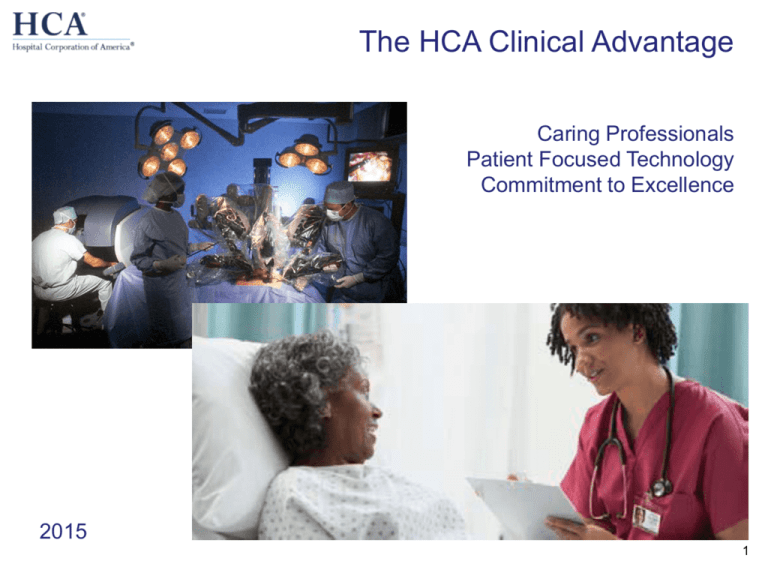
The HCA Clinical Advantage Caring Professionals Patient Focused Technology Commitment to Excellence 2015 1 HCA’s Commitment to Excellence Begins with Our Caregivers HCA invests in the professional development of our caregivers to assure patient care is based on the latest and best knowledge: HCA nurse development: • 140,000 classes completed by 34,000 nurses within the last 7 months • Over 1,100 nurses obtained advanced certifications in the last 6 months HCA pharmacist development: • HCA has launched over 20 continuing pharmacy education classes within the past 2 years • Over 4,100 pharmacy certificates have been issued 2 HCA is Continuously Improving Bedside Nursing A System-wide Commitment to Excellence in Medical-Surgical Nursing A five year investment in advancing medical and surgical nursing practice Resulting in … Improved patient outcomes Improved patient satisfaction Define Excellence Rewards & Recognition Leadership Improved use of and value from health IT Five Year Plan for Excellence Fewer complications (2014 - 2019) Clinical Competence Innovation Equipment & Technology Improved communication with patients and their families and among caregivers Improved efficiency resulting in lower costs Professional development of nursing staff 3 Rigorous Review of Caregiver Credentials • HCA uses a single, computer-based system to review the credentials of all physicians and advanced providers (including advanced practice nurses, physician assistants, podiatrists, doctors of pharmacy) • Concerning information is presented to the Medical Staff, executives and Boards of our facilities prior to appointment. • HCA holds itself accountable for working with licensed, certified and quality caregivers 4 HCA Learns from Vast and Diverse Experience HCA Experience is vast: Western W Idaho C W Idaho Falls W Utah W San Jose Terre Haute C Kansas City Wichita W W W W Oklahoma City W 167 Hospitals 113 Surgery Centers 550 Physician Practices Dallas/FW W Austin W Houston W W C Frankfort C • 5% of hospital services in U.S. C C SW VA NW GA Atlanta E Columbus E Panhandle** W • 8 million patients with over 20 million patient interactions annually London Admissions 1,800,000 Deliveries 210,000 Surgeries 2,100,000 ER Visits 7,500,000 HCA Experience is diverse: • Populations served vary by culture, language and ability to afford care • Facilities range from large medical centers with multiple specialists and advanced technologies to urgent care clinics and physician offices • Locations span 20 states and England 5 HCA Delivers Superior Overall Quality HCA’s overall score is the highest of all healthcare systems. Hospitals are required to report on quality measures that target care for common conditions such as heart attack, heart failure, pneumonia and infections related to surgeries. This information is publicly available on the internet. Grand Composite Score 100% 98% 99.0% 97.6% 96% 95.9% HCA 94% Average of Next 5 Best Systems 92% CMS National Average 90% 2Q13 - 1Q14 Grand Composite Score = All measures accomplished / All measures that could have been accomplished http://www.medicare.gov/hospitalcompare/search.html 6 HCA Consistently Outperforms on Key Quality Measures In 2014, 85% of HCA’s U.S. Hospitals made The Joint Commission’s list of Top Performers - compared to 37% of non-HCA hospitals. Percentage of Hospitals Named as a Top Performer by The Joint Commission 100% 85% 80% 70% 75% 60% 50% 37% 25% 20% 25% 30% 0% 2011 2012 2013 2014 % HCA Hospitals Named Top Performers % non-HCA Hospitals Named Top Performers The Joint Commission accredits approximately 90 percent of all accredited hospitals in the United States 7 At HCA, Patient Safety Comes First HCA hospitals earned more A’s or B’s on report cards than non-HCA hospitals. 60% 56% Percentage of Hospitals by Safety Score April 2015 Release 40% 35% 29% 29% 25% 18% 20% 6% 1% 0% 1% 0% A B HCA C D F Nation (excluding HCA) Leapfrog is an independent organization that represents employers who seek to recognize and reward big leaps in healthcare safety, quality and customer value. 8 HCA Practices Endorsed by Key Healthcare Leaders Institute of Medicine Recognizes HCA Leading Practices Reduced medication errors using barcode scanners to match medications with patients Safer births for mother and child using standardized practices Reduced IV line infections with standardized practices and training Barcode Medication Administration (BCMA) verifies the patient’s identity (armband) and medication assuring that the right patient gets the right medication and right dose at the right time. As a result, patients experience fewer adverse drug events. HCA has developed a “bundle” of standardized care practices related to high-risk obstetrical conditions to improve patient outcomes and reduce costs. As a result, HCA’s maternal death rate of 6.5 per 100,000 births is half the national average of 13. HCA’s multi-year effort to reduce central line-associated bloodstream infections (CLABSIs) incorporates the best insertion and maintenance practices, standardization of central-line kits, and training for all HCA physicians. As a result, HCA has saved up to 200 lives and reduced hospital-acquired bloodstream infections by 57.4 percent with eighty HCA facilities at zero hospitalacquired bloodstream infections. The Institute of Medicine advises the nation on ways to improve health. It works outside of the U.S. federal government to provide independent guidance and analysis and relies on a volunteer workforce of scientists and other experts. 9 In an Emergency, HCA is Close and Responds Fast • For our sickest patients, we have created 67 trauma centers to minimize transport time, assure the availability of trained specialists and improve outcomes. • To provide care sooner and closer to home, HCA has added 46 free-standing emergency rooms and 51 urgent care centers to the emergency rooms in our 167 hospitals. • To further help patients find answers fast, we share our current waiting times on billboards and websites. 10 HCA is Committed to Consistent, Positive Outcomes • HCA partners with physicians to detect and reduce unintended variation in care. • To date, this Clinical Excellence approach has reduced complications by 11 percent and deaths by nine percent in key specialty areas.* * Heart attack, open heart surgery, blood stream infection, hip/knee surgery, back surgery and stroke 11 The Proven Impact of an HCA-developed Protocol A Case Study in Reducing Blood Stream Infections 1 One in 20 hospitalized patients get a blood stream infection which may result in prolonged care and even death. HCA infection rates are less than half the average rates. 0.9 Usual rate of infection Antibacterial washcloths introduced 0.8 0.7 0.671 0.686 0.648 0.6 0.5 0.525 0.520 0.475 0.459 Half the usual rate 0.436 0.400 Our clinically-proven best practice of routine washing with antibacterial washcloths reduces infections and improves the quality of patient care. 0.4 0.3 0.2 0.1 0 Q3 Q4 Q1 Q2 Q3 Q4 Q1 Q2 Q3 2012 2012 2013 2013 2013 2013 2014 2014 2014 12 HCA – Paving the Path to a Safer Delivery for Baby and Mom • HCA has proven that the use of specific protocols before, during and after labor prevents deaths from blood clots to the lung and strokes due to bleeding in the brain. • These rare but devastating events were reduced by half. • HCA mothers benefited from these protocols for several years before the study results could be published. • HCA’s publication of our results benefits all mothers. 13 HCA – Committed to Protecting our Youngest Patients Producing best-in-class approaches to reducing risk for newborn babies ‘No elective deliveries before 39 weeks’ has become an international standard of care. • HCA then determined the most effective method to engage physicians to reduce elective deliveries before 39 weeks was requiring another opinion to proceed. • HCA implemented these methods across our system allowing our patients to be among the first to benefit and reducing NICU admission by 75%. % NICU Admissions • HCA, in partnership with the March of Dimes, determined that babies delivered before 39 weeks of pregnancy were more likely to need neonatal intensive care. Elective Term Delivery and NICU Admission 20 17.8 15 10 5 8 4.6 0 37 38 39+ Weeks Weeks Weeks Weeks of Pregnancy *Clark et al, Am J Obstet Gynecol, 2009 14 Pioneering Standards for Superior Radiation Safety Right Exam • We consider alternative exams to achieve the desired test result while minimizing exposure to radiation. Right Site • We verify (double check) that the right patients receive the right tests or procedures. Right Dose • We follow national guidelines to assure that we always give the lowest dose of radiation possible. 15 HCA Medication Experience Leading the Way Early use of technology and practices to assure medication safety: • Electronic medication administration records eliminate handwriting and other errors in the medical record (since 1990s). • Bar-codes match medications with the patients receiving them (since 2002). • Computerized entry of orders in the medical record – eliminate handwriting errors, speeding care processes and providing key reminders (beginning 2006). • Software checks medication orders at the time they are entered to eliminate errors and assure best use (beginning 2013). 16 HCA’s Industry-Leading Anti-Influenza Program All hospitals believe that patients shouldn’t catch a sickness from their caregivers; HCA takes important steps to prevent it from happening. • Employees with direct patient contact are required to receive influenza vaccine each year, or wear a surgical mask. • HCA was the first national health system to implement such a policy. • From 2009 to 2012, 95% of HCA employees chose a vaccine (5% chose a mask) compared with the 2011 national average of 64% • Patients are screened for contagious conditions and if found or suspected, they are isolated from others. • It's HCA policy to keep sick employees at home and out of the hospital. Our caregivers can only take care of patients when they take care of themselves. 17 With Care Assure, HCA Makes it Easy for Patients to Control Their Health • HCA scans patients’ records for key test results that indicate a need for follow-up evaluation and care. • Care Assure staff call to remind each patient of the need for follow-up, to answer any questions and to help make appointments. • Before Care Assure, about half our patients sought follow-up care, now more than 85% do. 18 HCA - A Leading Provider of Breakthrough Cancer Cures and Treatments • Sarah Cannon is HCA’s cancer care and research organization - and is one of the world's largest: o Leads or participates in more than 500 trials per year which have included 200 research studies on drugs being used for the first time in humans and 80% of FDA-approved cancer therapies in the last 10 years o Provides treatment options that include stem cell transplants and the latest radiation therapy • Sarah Cannon cancer care is guided by nurse navigators and linked with community hospitals to provide coordinated, advanced care close to home. • As a result, Sarah Cannon patients have access to individualized care and promising new therapies from leading cancer experts. 19 Automatic Transmission of Vital Sign Data Relieves Nursing Burden While Saving Lives • As nurses and other nursing staff take vital signs (blood pressure, pulse rate, respiration rate, etc.) the results are immediately sent to the electronic medical record. • Computers are programmed to detect abnormal values and changes in these vital signs. • If the computer finds concerning results or trends, it notifies caregivers immediately, allowing early assessment and treatment, which is known to result in better patient outcomes. 20 HCA Uses Computers to Predict Your Future So We Can Improve It “Improving each patient’s care by learning from the 8 million patients we care for each year.” • HCA now rapidly accumulates detailed clinical information that we use to improve patient care. • This powerful databank is being used by our teams for HCA patients to: o Support care providers with alerts and reminders – assuring accurate treatment and consistent care. o Predict health risks allowing improved patient outcomes through prevention, early diagnosis, and proactive treatment. 21 Bringing Patient Data Together Patient Information Collected in Any HCA Facility Is Instantly Available in All HCA Facilities HCA Hospitals HCA Clinics HCA Practices HCA Surgery Centers Patient Information Captured and Sent Information Analyzed, Protected and Presented HCA Caregivers Use the Information to Provide Care • Next up, connecting HCA and non-HCA medical records. 22 HCA Knowledge Center facilitates and standardizes an examination of what is known HCA Clinical Excellence and Big Data approaches allow learning from the care HCA delivers HCA Is Creating a Learning Healthcare System Insights and New Knowledge Benefit HCA Patients First HCA Innovation Teams find and support leading practices HCA Research Units* test and prove the value of advances in care [*Partnership for Advancing Clinical Excellence (PACE) and Sarah Cannon Research Institute] 23 HCA Studies Are Advancing Knowledge and Care Faced with three accepted treatment options to avoid infections with a hard to treat bacteria (MRSA*), HCA and partners studied and determined the best option for ICU patients in all our hospitals: • HCA immediately implemented across our 165 hospitals allowing our ICU patients to be the first to benefit reducing all blood stream infections by 44 percent, MRSA by 37 percent and saving an estimated 50 lives each year in HCA. • Thanks to the research in HCA hospitals, all patients can benefit when their hospitals adopt this new treatment standard. *Methicillin-Resistant Staphylococcus Aureus 24 Sharing Our Learnings for the Benefit of All A selection of recent publications (1 of 2) • Association of a Bundled Intervention With Surgical Site Infections Among Patients Undergoing Cardiac, Hip, or Knee Surgery Journal of the American Medical Association – June 2015 • Maternal mortality in the United States: predictability and the impact of protocols on fatal post cesarean pulmonary embolism and hypertension-related intracranial hemorrhage. American Journal of Obstetrics and Gynecology - July 2014 • Development and Implementation of a Consensus Algorithm to Optimize Preoperative Antimicrobial Prophylaxis and Decrease Gram-Positive Surgical Site Infections for Cardiac and Orthopedic Procedures. Advances in the Prevention and Control of HAIs (AHRQ) - June 2014 • Defining and Incorporating Basic Nursing Care Actions into the Electronic Health Record. Journal of Nursing Scholarship. Accepted October 15, 2013 • A Systems Approach to Evaluating Ionizing Radiation: Six Focus Areas to Improve Quality, Efficiency, and Patient Safety. Journal for Healthcare Quality - September 19, 2013 • Targeted versus Universal Decolonization to Prevent ICU Infection. New England Journal of Medicine - June 13, 2013 • A Win for the Learning Heath System. Institute of Medicine - May 29, 2013 25 Sharing Our Learnings for the Benefit of All A selection of recent publications (2 of 2) • A Bundled Approach to Reduce Methicillin-Resistant Staphylococcus Aureus Infections in a System of Community Hospitals. Journal for Healthcare Quality - May 6, 2013 • The Clinical and Economic Impact of Nurse to Patient Staffing Ratios in Women Receiving Intrapartum Oxytocin. American Journal of Perinatology - March 18, 2013 • Developing a Program to Increase Seasonal Influenza Vaccination of Healthcare Workers: Lessons from a System of Community Hospitals. Journal for Healthcare Quality - March 8, 2013 • Ten Strategies to Lower Costs, Improve Quality, and Engage Patients: the View from Leading Health System CEOs. Health Affairs - February 2013 • Rapid Core Measure Improvement Through a “Business Case for Quality.” Journal for Healthcare Quality - August 29, 2012 • A CEO Checklist for High-Value Health Care. Institute of Medicine - June 5, 2012 • Oversight of Elective Early Term Deliveries: Avoiding Unintended Consequences. American Journal of Obstetrics and Gynecology - May 1, 2012 26

